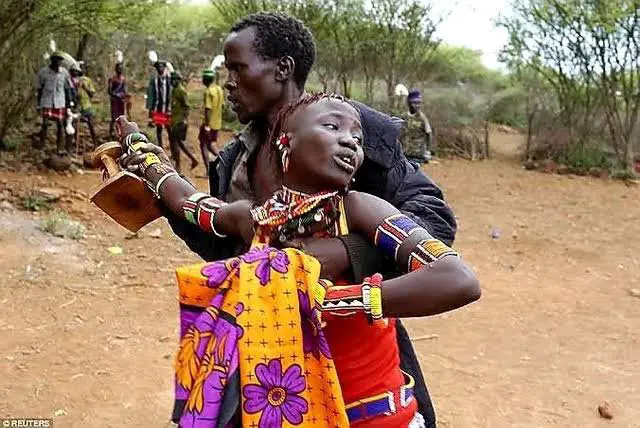In contrast to other places in the world, the tradition in Latuka, South Sudan, requires a man to pursue and obtain the approval of the lady he is attracted to and wants to marry before proceeding to win her parents’ consent.
Their culture and traditions dictate that in order to marry a woman, a man must first kidnap her with the assistance of other men, with whom he will set up an ambush, follow, and arrest the woman.
The woman who has been apprehended is then taken to her suitor’s house, where she is held against her will until the man later informs her father.
The lady’s father must beat up the prospective spouse in order to show his acceptance of his daughter’s proposed marriage to his son-in-law.
A woman’s choice and right to choose the man she will spend the rest of her life with are taken away when she is seen by a guy and abducted, regardless of how harsh or extensive the beatings are.
In other parts of the world, after both parties have agreed to live together, a lady is normally handed over to a man in a gentlemanly ceremony by the groom’s father, but Latuka does the exact opposite.
The girl’s suitor approaches her family with senior male relatives after taking her prisoner in order to formally ask for the girl’s hand in marriage.
While the girl is still in his care, her father must decide whether to grant the suitor’s request. There are certain ceremonial actions that follow the father’s “yes” or “no” response.
The father of the girl is expected to beat his prospective son-in-law as a show of support if the girl’s father accepts this suitor’s proposal.
According to sources, the beatings show that the man is prepared to suffer consequences for the person he loves, even beatings, in order to keep his wife safe.
It’s also noteworthy because even if the parent says “no,” the suitor has the choice of either returning the kidnapped daughter or going through with the marriage.
Since many people think it violates a girl’s rights to choose the person she is in love with and wants to spend the rest of her life with, this truly intriguing practice has caused controversy and continues to do so.
The Latuka, or Otuho, a small ethnic group, have long practiced subsistence farming. In the mountains of South Sudan, they keep sizable herds of cattle, sheep, and goats.
They frequently grow tubers like yam and potato as well as groundnuts, sorghum, maize, and other crops.
The Latukas are said to live a communal existence where nothing is hidden from anyone. They adhere to a sharing system, so no one individual has power over them. Instead, they are commanded by a group of powerful elders.
They are a well-known, strict clan that forbids a number of encroachments into other religions and cultures, including marriage. Despite years of criticism, this ban hasn’t changed….S££ MOR£

